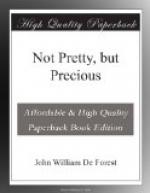Even in this frightful conjuncture the characteristic coolness of Duvernois did not forsake him: after a moment’s hesitation and a quick glance at his rival, he said, “I do not know him: I will call again.”
On the graveled walk which led from the yard gate to the doorstep the two men met and passed without a word—the face of the one as inexpressive of the strangeness and horror of the encounter as the mind of the other was unconscious of them.
Leighton immediately missed Alice. In a quarter of an hour he became anxious: in an hour he was in furious search of her.
Somewhat later, when Duvernois came once more to the house, accompanied by a fashionably-dressed youth, who, as it subsequently appeared, was his younger brother, he found the family and the neighborhood in wild alarm over the disappearance of Mrs. Leighton. The two at once returned to the hotel, procured saddle-horses and joined in the general chase.
It was ten o’clock at night, and the moon was shining with a vaporous, spectral light, when the maddest of chances brought the two husbands together over a body which the tide, with its multitudinous cold fingers, had gently laid upon the beach.
Leighton leaped from his horse, lifted the corpse with a loud cry, and covered the white wet face with kisses.
Duvernois leaned forward in his saddle, and gazed at both without a word or a movement.
“Oh, what could have led her to this?” groaned the physician, already too sure that life had departed.
“Insanity,” was the monotoned response of the statue on horseback.
The funeral took place two days later: the coffin-plate bore the inscription, “Alice Leighton, aged 23.” Duvernois read it, and said not a word.
“If you don’t claim her as your wife,” whispered the brother, “you may find it difficult to marry again.”
“Do you think I shall want to marry again?” responded the widower with an icy stare.
He was aware that he had lost a shame and a torment, and not aware that she might have been an honor and a joy, if only he had been able to love.
J. W. DE FOREST.
“How Mother Did It.”
The year 1839—that is, the year in which I was born—is of no manner of importance to myself or anybody else. The year 1859—that is, the year in which I began to live (Charlie and I got married that year)—is of considerable importance to myself and to somebody else. The two decades forming the interim between those years constitute my Dark Age, in which I teethed and measled and whooping-coughed, and went to school, and wore my hair in two long pig-tails, and loved molasses candy, and regarded a school-room as purgatory, a ball-room as heaven—when I sang and danced and grew as the birds and grasshoppers and flowers sing and dance and grow, because they having nothing else to do.




